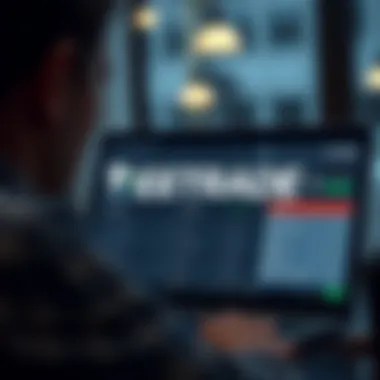Wiring Money to E*TRADE: A Complete Guide


Intro
Wiring money to an investment platform can feel like navigating a maze, especially if you're new to the whole investment scene. E*TRADE, known for its robust trading options and user-friendly interface, has become a popular choice for investors looking to simplify their financial dealings. But before the chips can fall where they may in the trading arena, you first need to fund your account.
In this guide, we will strip away the confusion, providing a clear pathway to wiring money to E*TRADE. We'll examine essential prerequisites and guide you step-by-step through the process. Plus, we’ll shed light on potential fees that might catch you off guard and share best practices to ensure that your transactions go smoothly. Remember, laying a solid financial foundation is crucial, whether you're just dipping your toes into the investment waters or are already a seasoned sailor braving the stock market seas.
Investment Terminology
For those diving into the financial pool, it's important to understand the lingo. Here’s a rundown of some common terms associated with wiring money and investing.
Definitions of Common Terms
- Wire Transfer: A method of electronically transferring funds from one bank account to another. It’s usually quick and can be initiated online or in person.
- Brokerage Account: A type of investment account where you can manage and trade securities, such as stocks and bonds. E*TRADE requires you to have one of these accounts to facilitate your investments.
- Clearing Time: The period it takes for a wire transfer to be processed. Typically, this can take a few hours to a couple of business days, depending on various factors.
- Recipient Information: This includes the name of the person or business you are sending money to, as well as the account details required to ensure it lands in the right spot.
Industry Acronyms and Abbreviations
- ACH: Automated Clearing House - an electronic network for financial transactions, including direct deposits and bill payments.
- FDIC: Federal Deposit Insurance Corporation - an agency that insures deposits at banks, including funds in your brokerage account.
- SEC: Securities and Exchange Commission - the U.S. government agency that oversees securities transactions.
Understanding these terms can be a game-changer. It prepares you to not only navigate your wiring transactions but also to digest the more complex concepts that may arise as your investment strategy evolves.
Expert Insights and Advice
Anyone can wire money, but doing so strategically is what differentiates the amateur from the savvy investor. Here are some insights into approaches and techniques that can bolster your financial prowess.
Strategic Investment Approaches
Start off with a clear objective for your investments. Are you aiming for short-term gains, or is it a long game you’re looking to play? Determining your investment horizon influences how much and how often you choose to wire money into E*TRADE.
- Dollar-Cost Averaging: This investment strategy involves consistently investing a fixed amount of money over time, regardless of stock market conditions. It helps mitigate risks associated with volatility.
- Sector Diversification: Place your bets across various sectors to cushion against unexpected downturns in any one area of the market.
Risk Management Techniques
Investing is not without its risks. However, knowing what to do when the tide turns can keep your portfolio afloat.
- Set Limits: Establish how much you are willing to risk on every trade and stick to it. This keeps emotion out of decision-making.
- Monitor Market Conditions: Conditions can change overnight, so staying on top of the financial news can offer a competitive edge.
In summary, a deep understanding of these terms and strategies gives you an advantage as you begin the process of wiring money to your E*TRADE account. Being well-informed fosters confidence, which is key when you're dealing with your financial future. Smoothing out the bumps in the road ahead isn’t just a good practice; it’s the best insurance you can equip yourself with in the financial arena.
Understanding ETRADE and Its Services
When it comes to investing, knowing where your money goes is as important as deciding how much to invest. E*TRADE has emerged as a key player in the brokerage world, offering various services that cater to a range of investors—from those just dipping their toes in the water to seasoned sharks navigating the deep end. Understanding what E*TRADE provides equips you with the knowledge to make informed choices regarding your financial journey.
Overview of ETRADE as a Brokerage Firm
Founded in 1982, ETRADE paved the way for online trading, transforming how individuals interact with the stock market. With its user-friendly platform, investors can buy and sell securities at the click of a button. What sets ETRADE apart is its commitment to simplifying the investment process while offering robust tools and resources.
For beginners, E*TRADE offers educational resources and guidance to help demystify the world of stocks, bonds, and mutual funds. It’s like having a personal coach in your pocket. On the other hand, advanced traders benefit from sophisticated tools such as real-time data analysis and extensive charting features that cater to a more detailed and strategic approach.
E*TRADE is not just about trading; it also provides services in retirement planning, investment guidance, and even financial advisory services. For the average investor, this means accessing a wealth of information and support all in one place. So, before diving into wiring money, it’s vital to grasp the full breadth of what this brokerage can offer.
Types of Investment Accounts Offered
E*TRADE serves a buffet of account options that cater to different investing styles and goals. Here’s what to consider:
- Brokerage Accounts: these are your all-purpose accounts for trading stocks, ETFs, and options without the bells and whistles of retirement benefits.
- Retirement Accounts: including Traditional IRA and Roth IRA, they allow you to set aside money for retirement in a tax-advantaged way. Planning for retirement is paramount, and these accounts help get you there.
- Managed Portfolios: if you prefer a hands-off approach, E*TRADE offers managed portfolios, where professionals take the reins based on your investment goals and risk tolerance. This is a good option if you’re not keen on day-to-day management.
- Education Savings Accounts: for investors looking to save for their children's future education costs, E*TRADE provides accounts designed specifically for that purpose. Planning for your kid's college can take a lot of weight off your shoulders.
It’s essential to identify which account type aligns with your financial aspirations. Each category comes with its own rules and regulations, and understanding these can help pave the way for a successful investment experience. Choosing the right account provides a solid foundation for your investment strategy.
"Choosing the right account type is like selecting the right tool for a job; having the right one makes all the difference."
In summary, knowing E*TRADE and the accounts they offer allows you to strategize your money's journey right from the start. With insights into their services and a thorough understanding of the account types available, you’ll be better prepared to initiate your wiring funds securely and efficiently.


Preparing to Wire Money
Wiring money may seem like a simple task on the surface, yet its importance cannot be overstated, especially when considering an investment platform like E*TRADE. It’s crucial to prep properly before diving into the wiring process. Without the right groundwork, investors could face delays, potential losses, or even worse—misplaced funds. By equipping oneself with knowledge about the prerequisites, the actions to undertake, and the types of transfers available, investors position themselves for a smoother transaction experience.
This section will outline the necessary steps to get started with wiring money, covering the essentials that every investor should be mindful of before taking the plunge.
Account Setup Requirements
When wiring money to ETRADE, the very first step involves ensuring that your account is correctly set up and ready for funding. This means double-checking that you have completed your registration on the ETRADE platform. You need to have a valid, linked bank account for smooth transactions. If your E*TRADE account is not active or if the information provided during setup is erroneous, you might run into significant trouble.
Moreover, your E*TRADE account must be verified. This means that all identification processes, including any KYC (Know Your Customer) checks, should be complete. Without proper verification, hitting the send button on a wire transfer is futile. Remember to keep your login credentials handy and ensure they are secure.
Documentation Needed
Documentation is paramount when it comes to wiring money, as it acts as the proof required to authorize your transfer. Generally, it’s good to have a few items on hand:
- Bank statement: This statement shows the account number and confirms the availability of funds.
- Identification: A government-issued ID, such as a driver’s license or passport, might be necessary for account verification.
- E*TRADE account details: Be aware of your E*TRADE account number and other pertinent details that could be needed during the transfer.
Lack of the right documents might mean delays or failed transfers, so it’s best to gather these before starting the wire transfer process.
Choosing the Right Funding Method
Selecting the right funding method is much like choosing the right tool for a job. There are two primary ways to wire money into E*TRADE: Bank Wire Transfer and ACH Transfer. Each method has its nuances and can cater to different investor needs.
Bank Wire Transfer
A Bank Wire Transfer is a quick and reliable means of sending funds directly from your bank to E*TRADE. The most significant characteristic of this method is its speed; funds are usually available within one business day. This immediacy can be a major advantage for investors wanting to act quickly on trading opportunities.
However, this method often comes with fees attached, making it a less attractive option for those with limited funds to invest. Additionally, not all banks process wire transfers at no additional charge.
Advantages of Bank Wire Transfers:
- Fast availability of funds.
- Direct transfer method, minimizing complications.
On the downside, the fees can eat into your investment, so it’s wise to check with your bank about specific charges before committing.
ACH Transfer
The ACH (Automated Clearing House) Transfer is another option, often favored for its lower cost. Unlike the bank wire, ACH transfers can be more economical as many financial institutions don’t charge fees for this service. The key characteristic is that while it’s less expensive, it may take longer for funds to clear; transfers can take anywhere from 1 to 3 business days.
This method is suitable for investors who are not in a hurry to access their money immediately and want to monitor expenses closely. the downside of ACH transfers is that they may not be as straightforward as wire transfers.
Advantages of ACH Transfers:
- Often no fees involved.
- Good for transferring larger sums over time.
In summary, when preparing to wire money to E*TRADE, every aspect matters. Taking the time to understand your requirements and the intricacies of different funding methods can make all the difference in ensuring a smooth and efficient transaction.
Step-by-Step Guide to Wiring Money to ETRADE
Wiring money to E*TRADE can seem a bit like navigating a maze for some, but it needn't be overly complicated. A thorough step-by-step guide can make all the difference in ensuring that your funds find their way into your account smoothly and swiftly. The process of wiring money can open doors to a wealth of investment opportunities, allowing you to seize market conditions without delay. Whether you’re a novice stepping into the investment world or a seasoned trader refreshing your memory, understanding this process will empower you to take charge of your financial journey.
Initiating the Wire Transfer
To kick off the wire transfer process, you first need to have your bank on board. Initiating a wire transfer typically begins at your bank's branch, through their online banking service, or potentially via a phone call depending on your bank's policies. Get ready to provide some essential account details - your account number at E*TRADE and the specific wiring instructions they provide.
An important thing to keep in mind is that some banks might charge a fee for sending a wire transfer. Be sure to check with your bank on this matter, as fees can vary widely. Also, if you're unfamiliar with the procedures, don’t hesitate to ask a bank representative for assistance.
Entering ETRADE's Wire Instructions
Once you have reached the point of entering the wire instructions, ensure that all details are spot on. E*TRADE will provide specific wire instructions, which usually include their bank name, routing number, and your unique account number with them. Accuracy is the name of the game here.
It's advisable to double-check the routing number and your account number before hitting that submit button. Mistakes can lead to delays or even misdirected funds. A small error in the account number could mean the difference between a successful transfer and a pending headache. Consider taking a moment to clarify every digit and check them twice.


Confirming the Transfer Details
After entering the necessary information, it’s time to confirm the details of your wire transfer. This step is akin to crossing the T's and dotting the I's—vital to ensuring everything is correct before sending your hard-earned money off into the financial cosmos. Most banking platforms will display a summary of the transfer details. Don’t just gloss over this; inspect it closely.
Make sure that the recipient is indeed E*TRADE and that all account numbers reflect your intended target. Once everything meets your satisfaction, proceed to confirm the transfer.
"A good investment doesn’t just happen; it’s a result of careful planning and execution. Always verify before you finalize your transaction."
It's common for banks to provide a confirmation page or a transaction number after completing this step. Make a habit of saving or printing this information for your records. It's not just about initiating the transfer; it's about having peace of mind knowing you've done your due diligence.
By following these steps diligently, investors can navigate the logistics of wiring money to E*TRADE with confidence, thereby setting the stage for successful investment ventures ahead.
Understanding Fees Associated with Wire Transfers
When investing in the stock market, understanding the costs associated with transferring money, especially the fees, can save you a good chunk of change. In this section, we dive into the fees tied to wiring money to E*TRADE, as these fees can impact your investment performance over time.
Determining the right method while considering these fees ensures that your investment journey is both efficient and cost-effective. Often, novice investors focus solely on the gains they expect, overlooking the expenses that come with funding their accounts. It’s pivotal to be informed about this aspect, as it shapes the overall profitability of your investment ventures.
By delving into E*TRADE's wire transfer fees and potential bank fees, you can avoid unexpected charges that might eat into your returns. This understanding is key to keeping your financial health in check.
ETRADE's Wire Transfer Fees
ETRADE implements its own structure when it comes to wire transfer fees. Usually, it’s straightforward, but it’s wise to keep an eye on this. As of the latest information, the fee for outgoing wire transfers is about $25. This fee applies whether you’re sending funds domestically or internationally. If you opt for an incoming wire transfer, ETRADE does not charge a fee for this, which can be a sweet deal, particularly if you’re managing multiple transactions.
Consider this:
- If you frequently wire money, the $25 outgoing fee can add up quickly.
- For larger investments, these fees can be seen as a healthy investment in the future growth of your portfolio. However, if your fund transfers are minimal, this could eat into your available investment capital more than you would like.
In some cases, investors overlook the possibility of using ACH transfers instead, which could be a more wallet-friendly choice. Ultimately, understanding how E*TRADE structures its fees is crucial to maintaining a robust investment strategy.
Bank Fees to Consider
While E*TRADE’s fees are significant, don’t forget about your bank’s policies when wiring money. Many banks charge various fees for wire transfers, which can range anywhere from $15 to $50 for outgoing domestic transfers.
Each financial institution has its own fee structure, and often these fees are not publicly listed. Here’s what to keep in mind:
- Bank Type: Traditional banks might have higher fees than online banks, some of which even offer free wire transfers, depending on account types.
- Transfer Type: Domestic vs. international transfers typically incur different fees; international transfers can carry additional costs such as exchange rates and intermediary bank fees.
- Membership Levels: Some premium bank accounts might have fee waivers or discounts on wire transfers based on account standing or monthly balance.
"Always check with your bank about their fee policy before you wire money; it can save you a lot in the long run!"
Before initiating any transfer, doing your homework on potential bank fees can be beneficial in managing your overall costs. It allows you to strategize effectively, ensuring you keep as much money in your pocket as possible while investing wisely through E*TRADE.
In summary, understanding the fees associated with wiring money, both from E*TRADE's side and your bank's, is essential for clear financial planning. Ensuring that you factor these into your investment strategy will help you maximize your returns and enjoy a smooth funding experience.
Tips for Successful Money Wiring
Wiring money to E*TRADE or any financial institution can feel like walking a tightrope. One little misstep, and you could find yourself in murky waters. This section delves into crucial strategies that can help both novice and seasoned investors navigate the intricacies of money transfers. Understanding these tips not only enhances the likelihood of a successful transaction but also fortifies your overall investment experience.
Double-Checking Account Information
Ensuring the accuracy of your account information is paramount when wiring money. Imagine sending funds to an unfamiliar account due to a simple typo in the account number or routing details. It's akin to sending a letter without checking the address; it may reach someone else entirely.
Before you hit that send button, verify your E*TRADE account information. This includes:
- Account number: Ensure it's the exact number linked to your E*TRADE profile.
- Routing number: This is critical for bank transfers; even a single digit off can cause delays.
- Your bank’s details: Cross-reference the information with your bank’s records.
Consider creating a checklist to double-check everything. It’s a small effort that can save you from future headaches. And let’s be honest, who would want to deal with delayed funds or worse, losing your money entirely?
Timing Your Transfers
Timing can make or break the effectiveness of your wire transfer. Each bank has its own cut-off times, meaning that a transaction initiated just a few minutes after the deadline could be pushed to the next business day. When transferring funds to E*TRADE, here's what to keep in mind:


- Weekdays are best: Aim for weekdays, as weekends and holidays can delay processing times.
- Know the cut-off times: Check the specific cut-off time for your bank regarding wire transfers. By having this information, you can plan your transfer efficiently.
- Market hours: If your aim is to invest immediately after transferring, consider making your transfer during market hours. This can help ensure your funds are available when you want to make a move.
Failing to time your transfer properly can lead to missed opportunities or unnecessary waiting. This diligence helps you put your money to work sooner rather than later.
Tracking Your Transfer
Once you've successfully initiated your wire transfer, the waiting game begins. However, remaining in the dark about the status of your funds can be quite unnerving. This is where tracking comes into play. Most financial institutions, including E*TRADE, provide tracking options for wire transfers. Here’s what you can do:
- Use your bank's tracking services: Most banks offer online platforms or apps where you can check the status of your wire transfer. Knowing where your money is at any point can significantly reduce anxiety.
- Save the confirmation: After initiating a transfer, you’ll typically receive a confirmation number. Keep this handy; it could be vital if there are any issues.
- Communicate with customer service: If you find the tracking information unsatisfactory or encounter delays, don't hesitate to contact customer support. Prompt action can resolve issues faster.
Having the capability to track your transfer reassures you but also empowers you with control over your finances. It’s like having a GPS for your money; you wouldn’t want to take a detour unexpectedly.
"An ounce of prevention is worth a pound of cure; this rings particularly true in finance."
By adhering to these tips, you pave the way for a seamless and efficient money wiring experience. They might seem trivial, but attention to detail can yield substantial benefits in protecting your investments.
Common Issues and Troubleshooting
Understanding common issues that can arise during the money wiring process to ETRADE is crucial for ensuring a smooth transaction. By being aware of these potential pitfalls, investors can take proactive measures to avoid delays and mistakes. This knowledge not only enhances the overall experience but also contributes to effective fund management while using the ETRADE platform. Let’s delve into the most frequent challenges and the steps to tackle them.
Delayed Transfers and Their Causes
Delayed transfers can be a source of consternation for investors. It’s not just about waiting; it’s about the uncertainty that comes with it. Transfers may be delayed for several reasons, including:
- Bank Processing Times: Your bank may take longer to process the wire transfer, especially if it’s processed on a weekend or holiday.
- Inaccurate Account Details: Small mistakes in the account number or beneficiary details can lead to significant delays.
- Compliance Checks: Your bank may conduct additional checks for compliance reasons, which can hold up the transfer.
To avoid these delays, always double-check the information provided before initiating the transfer.
Errors in Transfer Instructions
Errors in transfer instructions can lead to funds going awry, and nobody wants that. Mistakes in the routing number, E*TRADE’s account number, or even the wrong name can result in the funds being redirected or delayed. Common errors include:
- Mismatched Information: If the name on the account doesn’t match the name on the transfer instruction, it can raise flags.
- Wrong Routing Number: Each bank has a unique routing number; using the wrong one can mislead your funds.
To minimize such errors, it’s advisable to carefully review your transfer instructions and cross-check them with E*TRADE’s provided documentation.
Resolving Payment Discrepancies
Discrepancies can occur when the amount transferred does not match what appears in your E*TRADE account. This issue can be disheartening, but taking the right steps can resolve it. Potential causes may include:
- Partial Transfers: Sometimes, banks process transfers in batches, leading to only part of your total showing up initially.
- Currency Fluctuations: If your transfer involves currency conversion, fluctuations may alter the amount credited to your account.
To resolve these discrepancies, immediately contact E*TRADE’s customer support for assistance. Keeping all documentation related to your transfer handy can expedite the process.
Always stay informed about the processes involved in wiring money. This knowledge equips you to manage your investments with confidence.
Understanding and addressing these common issues can improve your transfer experience and ensure that your funds are handled properly. Being proactive and aware allows investors to navigate potential snags more effectively.
Post-Transfer Considerations
Once the wires are done and the dust settles, there's still a bit of housekeeping to attend to. Post-transfer considerations are not just administrative tasks; they can significantly affect how you manage your investment moving forward. Forgetting to confirm the availability of funds or touching on new strategies after transferring money can be mistakes that seasoned investors avoid yet beginner ones might fall into. This section emphasizes how to verify your funds and manage them effectively post-transfer, ensuring you stay ahead in your investment game.
Verifying Fund Availability in Your Account
When the wire transfer is complete, the first order of business is checking your E*TRADE account to make sure the funds are where they ought to be. Don’t assume everything’s hunky-dory just because you sent the money. A few things to keep in mind:
- Timing: Funds from wire transfers often show up relatively quickly, but it can still take some time depending on the banks involved. It’s wise to check your account periodically within the first few hours of the transfer to see if your money is reflecting.
- Deposit Confirmation: E*TRADE typically sends a notification via email or through their platform confirming the deposit. If you don’t see it, don’t hesitate to reach out to their customer service for clarity. Sometimes errors do pop up, and it's always better to be proactive than reactive.
- Account Balance Verification: Access your account through the E*TRADE mobile app or website. Navigate to your account summary. If the funds haven’t appeared, take note of any error messages or flags that may have arisen during the transfer process.
"Taking a moment to verify can save you a whole lotta headache down the line."
Strategies for Efficient Fund Management Post Transfer
Now that you’ve made sure your funds are available, it’s essential to have a strategy in place to manage these assets effectively. Consider the following strategies:
- Budgeting Your Investments: Determining how much you want to allocate to stocks, ETFs, or other vehicles can help. A well thought out budget that factors in risk tolerance and market conditions will go a long way.
- Setting Goals: Define what you want to achieve with these funds. Will they be for short-term trading or long-term investments? Having clear goals can help inform your trading strategy.
- Diversification: It’s tempting to throw it all into one stock. But remember, variety is the spice of life and the key to reducing risks. Spread your investments across different sectors and assets.
- Monitoring and Rebalancing: After investing, keep an eye on how your portfolio performs. If any assets start straying from your desired allocation, don’t hesitate to make adjustments. Regular rebalancing ensures that your investments stay aligned with your financial goals.
- Educating Yourself Continuously: The financial landscape changes as much as the weather. Staying updated on market trends and investment strategies can empower you to make well-informed decisions.
Navigating the world of investments post-transfer with these strategies will not only increase your confidence but also allow your funds to work smarter for you.
Finding on-point resources to keep learning, such as articles on Investopedia or forums like r/investing on Reddit, is crucial for enhancing your investment knowledge.







